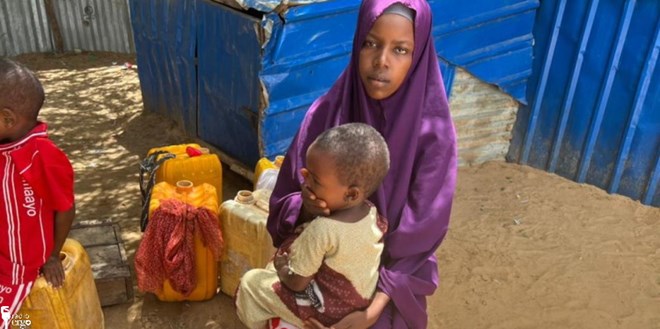
Thursday June 9, 2022

Isha, 19, is pregnant and worried how to get proper care in Waqla IDP camp as her delivery time nears/Naima Salah/Ergo
Halimo, 27, suffered obstetric fistula caused by prolonged
labour during the birth of her third child in March in a displacement camp in
the Somali capital Mogadishu that has no access to health facilities.
“This condition I am living with now has completely changed
my life. But I thank Allah that I am still alive,” she told Radio Ergo.
Halimo’s family survives on one meal a day. With her fistula
condition, meaning that she leaks urine, nobody will hire her even for laundry
jobs so she is struggling to buy what they need.
“They talk about me openly everywhere. These women around
me, my neighbours don’t hide anything, they insult me that I can’t hold my
urine. When my kids fight with their kids, they called me names. I just keep
quiet, Allah is watching them,” said Halimo, whose real name has been concealed
to protect her from further shame.
She was in labour for three days and bled a lot, with only a
traditional midwife in attendance. Lack of access to care during pregnancy,
labour and birth is particularly worrying for the 800 displaced families who
have populated Waqle camp in Kahda district since the beginning of the year.
Halimo’s husband, who arrived in the camp with Halimo from
Bay region, abandoned her due to her obstetric fistula and married another
wife. He sends occasional money whilst she raises the three children alone.
Waqle is one of several blocks in the larger Shabelle IDP
camp, where another 2,600 families are living. The people fled various crises
including drought and loss of crops, conflict, and previous floods in Bay,
Bakool, Shabelle and Juba regions.
Conditions in Waqle are very poor. The IDPs suffer food
shortages and live in flimsy shelters. Water is scarce and costs two cents for
a 20-litre container. Women usually look for menial jobs like laundry, earning
at most a dollar a day.
Isha Isack Mohamed, 19, a mother of two, is currently in the
late stages of pregnancy and is worried about her fate having seen the
difficulties faced by other women in the camp. Her main concern is where to
find health care as there is no facility in or nearby the camp, and not even a
vehicle that could be used for transportation to health facilities further
away.
“We have two women who attend to us in this camp,
traditional midwives. We need better health services and we have no access to
hospitals,” Isha complained.
She is now alone with her children as her husband went back
to their farm when the rainy season started hoping to plant again. In the camp
he had earned little from odd jobs as a porter.
One of the two midwives in the camp, Hawo Ali Nur, told
Radio Ergo that most women do not get nutritious food and a balanced diet
during their pregnancy and are weak, which contributes towards some of their
complications and prolonged labour.
However, Hawo and her colleague have no medical training or
modern equipment to help a safe delivery.
“I have this blade, plastic paper and cotton, these are
enough for me to help a woman deliver,” she said.
Hawo said she has assisted 26 women during their deliveries
in Waqlo since January. Most mothers experiencing difficulties, she added, were
as young as 15 up to 30.